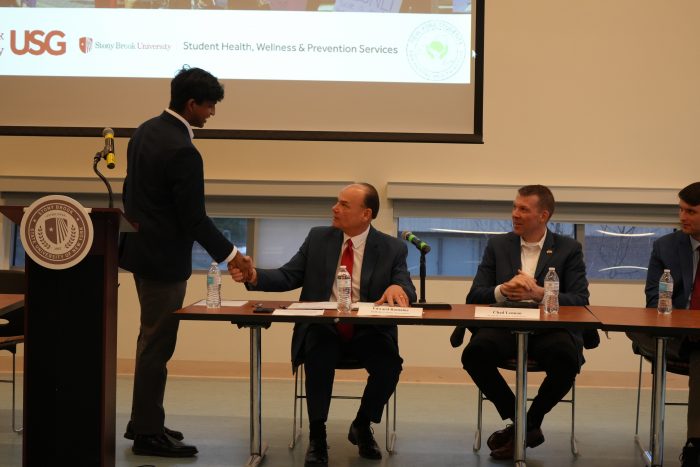College students fight to have suicide prevention laws implemented

By Aramis Khosronejad
Vignesh Subramanian, head of the New York Students for Mental Health Action Coalition, has been working determinedly toward his goal of implementing more diverse and improved suicide prevention acts in the state Legislature.
Subramanian has been successful a few times already and has been following a certain plan: Rewriting and amending the Student Suicide Prevention Act that has already been implemented and established. Subramanian was hoping to follow this same course of action to augment suicide prevention laws to incorporate college students as well — currently, the SSPA of New York mainly focuses on K-12.
This idea was well supported by many different colleges, several county officials and some state-level lawmakers. This fervent support was demonstrated through a rally that Subramanian was involved in organizing. At this event, student delegates from many Long Island universities such as Stony Brook, Hofstra, LIU and Adelphi were present to help push these changes to the SSPA to move forward.
A few lawmakers were also present, namely, Assemblywoman Jodi Giglio (R-Riverhead) and state Sen. Anthony Palumbo (R-New Suffolk). Subramanian also rallied the support of the SSPA’s Senate sponsor, Sen. Brad Hoylman-Sigal (D-Greenwich Village) as well as Assemblyman Daniel O’Donnell (D-Morningside Heights).
Despite all of this support, there was an unexpected obstacle that had to be resolved.
Despite O’Donnell’s background in ardently and actively promoting such suicide prevention laws and their improvement, he and his office provided an unanticipated problem for Subramanian and the NYSMHA Coalition.
Since the Legislature is in session for a limited period, time is very precious. O’Donnell and his office have “been noncommittal about amending the SSPA and has not communicated with coalition leaders directly, frustrating student government leaders and partner advocates,” according to Subramanian.
In an interview, he admitted to being disappointed by O’Donnell’s inaction and explained that he believes O’Donnell “was concerned that amending the bill would lengthen the process the bill would have to take to reach passing.” Regardless, the whole conflict was “very unanticipated” and Subramanian and his colleagues scrambled for “alternative strategies.”
Subramanian and his coalition were forced to adapt quickly to their new situation, so they had to take a new tactic. In contrast to the original plan, which was using the SSPA as a blueprint, Subramanian and his colleagues decided to create an entirely new bill called the College Student Suicide Prevention Act.
The CSSPA would place emphasis on the importance of having a college-level suicide prevention law in place for students of higher education, maybe even more so than those from K-12. The bill has already been finalized and is being planned to be introduced in early April.
The CSSPA is currently receiving support from Assembly Higher Education Chair Patricia Fahy (D-Albany) and state Sen. Lea Webb (D-Binghamton).
Amid each obstacle, Subramanian said he “doesn’t plan to stop” his pursuit of suicide prevention legislation. He expressed his goal to continue his efforts to enact better suicide prevention laws for students of all fields and ages across a broader geographical scope.






